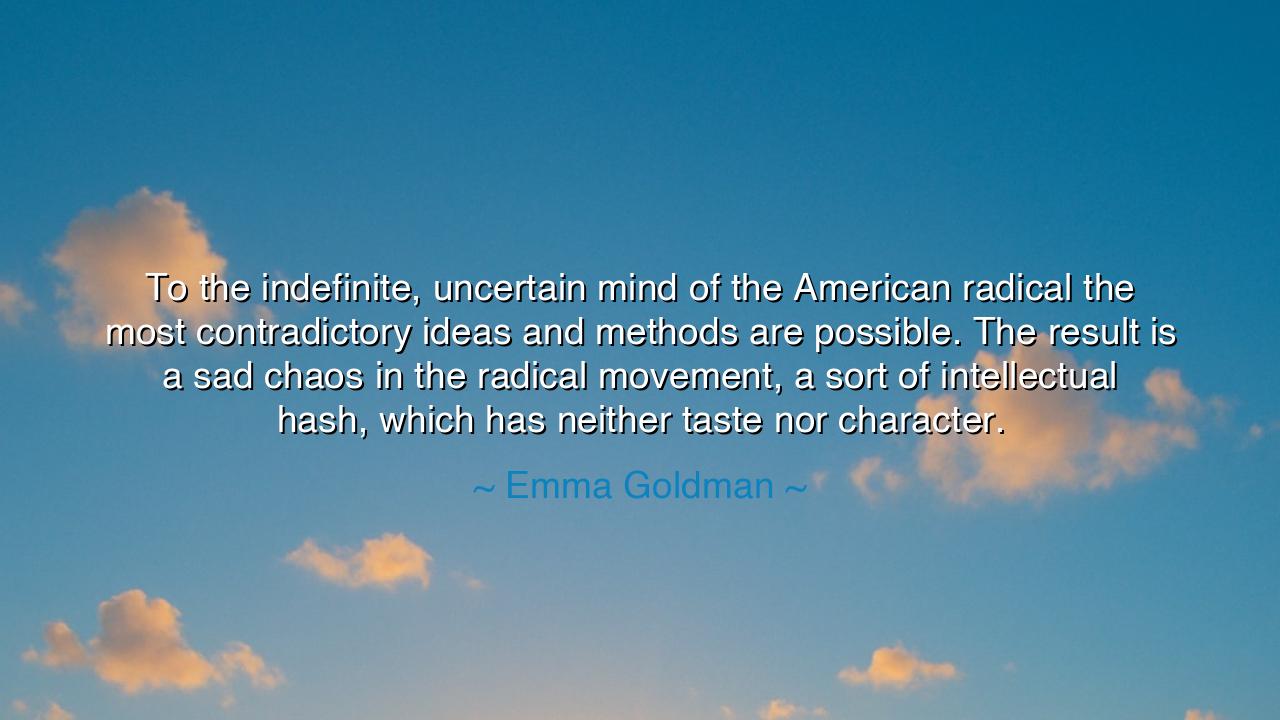
To the indefinite, uncertain mind of the American radical the
To the indefinite, uncertain mind of the American radical the most contradictory ideas and methods are possible. The result is a sad chaos in the radical movement, a sort of intellectual hash, which has neither taste nor character.






Hearken, children of reflection, to the words of Emma Goldman, who declares: "To the indefinite, uncertain mind of the American radical, the most contradictory ideas and methods are possible. The result is a sad chaos in the radical movement, a sort of intellectual hash, which has neither taste nor character." In these words lies a meditation upon clarity of purpose, the peril of inconsistency, and the need for coherence in thought and action. Since the days of the ancients, philosophers have warned that ambition and idealism, when untethered by reason and discipline, may devolve into confusion rather than achieve transformation.
The ancients understood that the mind, when uncertain and unfocused, is prone to error and disorder. Aristotle, in his Nicomachean Ethics, teaches that virtue arises from deliberate intention and consistent action. Goldman’s critique of the American radical highlights the dangers of pursuing change without disciplined thought: contradictory ideas, when combined without scrutiny, produce a sad chaos rather than progress. In her observation, we see the timeless truth that purpose must be paired with clarity and method to bear fruit.
Consider the historical example of the early revolutionary movements in Athens, where factions of the populace, each driven by passionate yet conflicting ideals, sought reform without a coherent plan. Their efforts, though energized, often produced turmoil, undermining the very goals they sought to achieve. Goldman’s description of a sort of intellectual hash echoes this ancient pattern: fervor alone cannot substitute for strategic reasoning and disciplined unity of thought.
The quote also illuminates the tension between idealism and practicality. Goldman observes that the contradictory ideas and methods within the radical movement create chaos, undermining the potential for meaningful reform. Ancient philosophers, from Plato to Cicero, emphasized that wisdom is not merely the possession of ideals, but the ability to harmonize vision with method, to pursue noble ends through coherent and disciplined means.
Moreover, Goldman’s words serve as a cautionary reflection on the human tendency to be swayed by novelty or contradiction without critical evaluation. The indefinite, uncertain mind is vulnerable to fragmentation, adopting positions for their emotional appeal rather than their rational coherence. History bears witness: movements, no matter how noble in aspiration, fail when participants cannot reconcile ideas with strategy, leading to disillusionment, infighting, and the erosion of moral authority.
From this reflection emerges a timeless lesson: to effect meaningful change, one must cultivate clarity of thought, coherence of purpose, and discipline in action. Passion without order leads to sad chaos; idealism without method produces an intellectual hash devoid of taste or character. Goldman teaches that wisdom and careful reflection are essential companions to fervor, ensuring that energy is directed toward transformative ends rather than dissipated in confusion.
Practical actions follow naturally. When pursuing reform or innovation, first clarify your principles and objectives. Examine ideas critically, seeking coherence rather than contradiction for its own sake. Collaborate with others who share disciplined purpose, and resist the allure of chaotic novelty that undermines effectiveness. In thought and deed, cultivate both passion and precision, ensuring that your efforts bear the fruits of clarity, strength, and enduring impact.
Remember, children of the ages, that the mind untethered by clarity is like a ship without rudder, destined for turbulence. Emma Goldman’s words illuminate the eternal truth that purpose, coherence, and disciplined reasoning are as vital to human endeavor as energy and idealism. By aligning passion with clarity, one avoids the sad chaos of fragmented thought and cultivates action imbued with taste, character, and lasting power, guiding movements, communities, and the self toward meaningful and enduring transformation.






AAdministratorAdministrator
Welcome, honored guests. Please leave a comment, we will respond soon